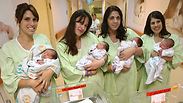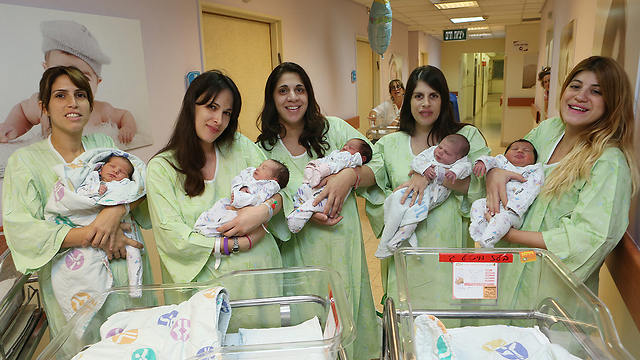
It's raining babies: Baby boom following December's stormy weather
Last year's stormy weather was apparantly a blessing in disguise for many Israeli couples; 'There were a few days in December that we couldn't leave the house because of the storm, so it was a great opportunity to work on making a baby,' says new mother Oxana Belayev.
Kaplan Medical Center in Rehovot reported a surprising rise as 700 births took place this August in comparison to 500 births that occurred last year.
"There were a few days in December that we couldn't leave the house due to the bad weather, so it was a great opportunity to work on making a baby. My oldest son was also born in September, so it seems that winter is a good season for couples," said Oxana Belayev. who gave birth at the Kaplan Medical Center last week.
Related stories:
- CBS: Jewish births up, Muslim births down
- Settlers' birth rate three times higher than other Israelis
- Rate of single mothers doubles since 2000
"I guess the winter really had a great affect on us, because we couldn't leave the house and were looking for things to do. Winter can be boring, so you spend most of the time in bed. And it's not just us; we have many friends that are due soon," said Ossi Weinstein from Ramat Gan, who gave birth last week to her firstborn at the Rabin Medical Center in Petah Tikva.
The growth in birth rate was also felt in other hospitals throughout Israel. Ziv Medical Center in Safed reached a new record number of 334 births in comparison to 312 that took place at the same time last year.
A record was also broken in Poriya Medical Center with 339 births, but this increase was relatively small compared to the 334 births in August 2013.
At the Soroka Medical Center in Be'er Sheva, where the women were forced to give birth under rocket fire at a bomb-protected delivery room, the birth rate increased from 1,300 to 1,484, while the birth rate at HaEmek Medical Center in Afula jumped from 354 to 373 births.
However, some of the hospitals said that Operation Protective Edge may have altered the data, since many women preferred to give birth in northern Israel, away from the rockets and sirens.
"It is possible that that the cold winter with the storms and power cuts drove couples to take cover under the sheets," said Obstetrics Department director Prof. Zion Hagai.
Labor Ward Director Prof. Yariv Yogev, on the other hand, offered that it may not be about winter boredom, but rather a matter of the human biology.
"The rule of nature is that there are more births in warm months because unlike the cold winter, in the summer there is a survival advantage. In addition, biologically, women are more inclined to get pregnant in the winter, so I am not sure that getting pregnant depends on the frequency of intercourse," Prof. Yogev explained.











